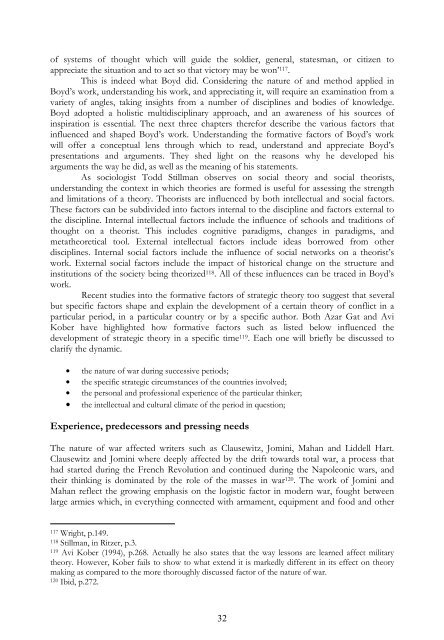Science, Strategy and War The Strategic Theory of ... - Boekje Pienter
Science, Strategy and War The Strategic Theory of ... - Boekje Pienter
Science, Strategy and War The Strategic Theory of ... - Boekje Pienter
Create successful ePaper yourself
Turn your PDF publications into a flip-book with our unique Google optimized e-Paper software.
<strong>of</strong> systems <strong>of</strong> thought which will guide the soldier, general, statesman, or citizen toappreciate the situation <strong>and</strong> to act so that victory may be won’ 117 .This is indeed what Boyd did. Considering the nature <strong>of</strong> <strong>and</strong> method applied inBoyd’s work, underst<strong>and</strong>ing his work, <strong>and</strong> appreciating it, will require an examination from avariety <strong>of</strong> angles, taking insights from a number <strong>of</strong> disciplines <strong>and</strong> bodies <strong>of</strong> knowledge.Boyd adopted a holistic multidisciplinary approach, <strong>and</strong> an awareness <strong>of</strong> his sources <strong>of</strong>inspiration is essential. <strong>The</strong> next three chapters therefor describe the various factors thatinfluenced <strong>and</strong> shaped Boyd’s work. Underst<strong>and</strong>ing the formative factors <strong>of</strong> Boyd’s workwill <strong>of</strong>fer a conceptual lens through which to read, underst<strong>and</strong> <strong>and</strong> appreciate Boyd’spresentations <strong>and</strong> arguments. <strong>The</strong>y shed light on the reasons why he developed hisarguments the way he did, as well as the meaning <strong>of</strong> his statements.As sociologist Todd Stillman observes on social theory <strong>and</strong> social theorists,underst<strong>and</strong>ing the context in which theories are formed is useful for assessing the strength<strong>and</strong> limitations <strong>of</strong> a theory. <strong>The</strong>orists are influenced by both intellectual <strong>and</strong> social factors.<strong>The</strong>se factors can be subdivided into factors internal to the discipline <strong>and</strong> factors external tothe discipline. Internal intellectual factors include the influence <strong>of</strong> schools <strong>and</strong> traditions <strong>of</strong>thought on a theorist. This includes cognitive paradigms, changes in paradigms, <strong>and</strong>metatheoretical tool. External intellectual factors include ideas borrowed from otherdisciplines. Internal social factors include the influence <strong>of</strong> social networks on a theorist’swork. External social factors include the impact <strong>of</strong> historical change on the structure <strong>and</strong>institutions <strong>of</strong> the society being theorized 118 . All <strong>of</strong> these influences can be traced in Boyd’swork.Recent studies into the formative factors <strong>of</strong> strategic theory too suggest that severalbut specific factors shape <strong>and</strong> explain the development <strong>of</strong> a certain theory <strong>of</strong> conflict in aparticular period, in a particular country or by a specific author. Both Azar Gat <strong>and</strong> AviKober have highlighted how formative factors such as listed below influenced thedevelopment <strong>of</strong> strategic theory in a specific time 119 . Each one will briefly be discussed toclarify the dynamic.• the nature <strong>of</strong> war during successive periods;• the specific strategic circumstances <strong>of</strong> the countries involved;• the personal <strong>and</strong> pr<strong>of</strong>essional experience <strong>of</strong> the particular thinker;• the intellectual <strong>and</strong> cultural climate <strong>of</strong> the period in question;Experience, predecessors <strong>and</strong> pressing needs<strong>The</strong> nature <strong>of</strong> war affected writers such as Clausewitz, Jomini, Mahan <strong>and</strong> Liddell Hart.Clausewitz <strong>and</strong> Jomini where deeply affected by the drift towards total war, a process thathad started during the French Revolution <strong>and</strong> continued during the Napoleonic wars, <strong>and</strong>their thinking is dominated by the role <strong>of</strong> the masses in war 120 . <strong>The</strong> work <strong>of</strong> Jomini <strong>and</strong>Mahan reflect the growing emphasis on the logistic factor in modern war, fought betweenlarge armies which, in everything connected with armament, equipment <strong>and</strong> food <strong>and</strong> other117 Wright, p.149.118 Stillman, in Ritzer, p.3.119 Avi Kober (1994), p.268. Actually he also states that the way lessons are learned affect militarytheory. However, Kober fails to show to what extend it is markedly different in its effect on theorymaking as compared to the more thoroughly discussed factor <strong>of</strong> the nature <strong>of</strong> war.120 Ibid, p.272.32
















